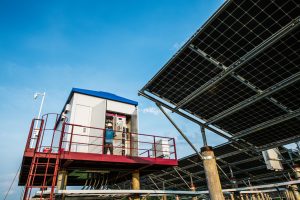
Written by Victoria Sabula, CEO, AECF, and first published on Business Day on 04 December 2023
Africa has the potential to contribute to the global target of tripling renewable capacity and doubling efficiency by 2030. The urgent call to ramp up the global target for renewable energy was presented in a Reuters report released during preparation for the COP28 event in Dubai, providing governments and the private sector with actionable policy recommendations.
The report outlines a pledge to urgently limit global warming to 1.5°C and avoid its most disastrous effects. Governments can enable more energy efficiency by increasing worldwide renewable energy capacity to a minimum of 11,000 GW while simultaneously doubling annual energy efficiency improvements.
The great news is that Africa can stride forward into this renewable energy future, provided it receives the necessary investments in its energy sector. In many ways, Africa should serve as a template for successful clean energy utilization, given its abundance of natural resources.
Despite this, the continent finds itself in a precarious and difficult position whereby it only receives 2% of global energy investments. In fact, the UN Economic Commission for Africa report states that an annual commitment of $40bn is imperative to meet the continent’s energy requirements.
Pressing needs
According to the International Renewable Energy Agency, insufficient investments hinder Africa’s ability to spur economic growth. The agency notes this impediment to job creation in the renewable energy sector. Jobs could increase from 350,000 in 2020 to 4 million by 2030 and 8 million by 2050. The cost of capital for renewable energy projects in the developing world can be seven times higher than in the developed world.
Apart from the environmental consequences of generating energy, how uncertainties in the economy moderate the effect of energy generation on the environment is yet to be given the desired attention. At present, several African countries have doubled down on their plans to develop new natural gas fields for domestic and export purposes, which leads to policy tensions due to the inherent long-term economic and social risks and African countries’ net-zero aspirations.
In addition, Africa’s high population makes it difficult for governments and energy companies to meet the continent’s energy demand. With the continent’s demand for electricity projected to increase by 3% a year, it will be impossible to achieve sustainable development with Africa’s energy mix, where domestic energy supply is still dominated by fossil fuels (71%).
None of these issues should come as a surprise. Achieving triple renewable energy capacity could mean a fundamental transformation of Africa’s economy, as it would require an energy transition and sufficient investments in renewable energy.
Finding solutions
To address the need for a fair and accelerated energy transition Africa requires making key patents, especially those related to battery and storage capacity, freely available. This also entails providing investments that stimulate additional demand and output across economic sectors, thus having a positive effect on GDP. These investments will not only create immediate economic opportunities but also open up Africa’s economy with lower energy costs and improved living standards, thereby alleviating poverty.
Investing in renewable energy also calls for scaling up innovative and transformative initiatives. Africa has no shortage of innovative solutions to propel it to a successful energy transition. The Africa Enterprise Challenge Fund’s Renewable Energy & Adaptation to Climate Change Technologies (AECF React) programme stands out as a shining example of the potential of investing in renewable energy. The React programme targets affordable off-grid stand-alone solar household systems.
Since 2021, this initiative has been instrumental in stimulating small- and medium-sized enterprises to develop business models, services, and products in renewable energy and energy efficiency, thereby improving the lives of underserved communities and ensuring that innovative climate-resilient investments continue to have a meaningful effect on local communities and global climate resilience efforts.
These efforts not only promise job creation for millions of Africans but also hold the potential for economic growth, propelling Africa into a brighter and more sustainable future.
Africa has immense potential and can rise to the challenge of contributing towards tripling the world’s renewable energy capacity. But the continent cannot do it alone, and the support required needs to be a part of the COP28 discussions and pledges.
Africa’s change-makers are encouraged to follow COP28 keenly and overcome the challenge of making this a reality through collaboration from governments, donors, and private sector actors to catalyze the continent’s renewable energy capacity.
